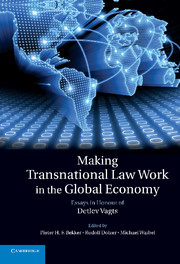Book contents
- Frontmatter
- Contents
- List of contributors
- Foreword: the transnationalism of Detlev Vagts
- List of cases cited
- List of abbreviations and acronyms
- Introduction: a Festschrift to celebrate Detlev Vagts' contributions to transnational law
- 1 Detlev Vagts and the Harvard Law School
- 2 Constructing and developing transnational law: the contribution of Detlev Vagts
- I International law in general
- II Transnational economic law
- III Transnational lawyering and dispute resolution
- Bibliography of Detlev Vagts
- Index
Introduction: a Festschrift to celebrate Detlev Vagts' contributions to transnational law
Published online by Cambridge University Press: 17 November 2010
- Frontmatter
- Contents
- List of contributors
- Foreword: the transnationalism of Detlev Vagts
- List of cases cited
- List of abbreviations and acronyms
- Introduction: a Festschrift to celebrate Detlev Vagts' contributions to transnational law
- 1 Detlev Vagts and the Harvard Law School
- 2 Constructing and developing transnational law: the contribution of Detlev Vagts
- I International law in general
- II Transnational economic law
- III Transnational lawyering and dispute resolution
- Bibliography of Detlev Vagts
- Index
Summary
This Festschrift honours Professor Detlev Vagts and celebrates his profound scholarly contributions to and influence on the study and practice of transnational law over the last half-century.
On the occasion of his recent retirement from the Harvard Law School faculty and his eightieth birthday, the book brings together a wide range of leading scholars and practitioners from around the globe with a personal connection to the honouree: his colleagues at Harvard Law School and the American Society of International Law (ASIL, especially its Journal), as well as academics, judges and practitioners, many of them former students of Detlev Vagts, with whom his rich life and career have intersected. The book spans the entire spectrum of modern transnational law.
Soon after graduating from law school, Detlev Vagts realised that in the new reality of international relations, law may more readily be understood as extending beyond the classical State system. Philip Jessup, in his famous Storrs Lectures at Yale in 1956, labelled this phenomenon ‘transnational law’, which he defined as ‘all law which regulates actions or events that transcend national frontiers. Both public and private international law are included, as are other rules which do not wholly fit into such standard categories.’ The increasing mobility of people, capital and goods required an expansion of the legal horizon beyond classical public international law and a State-centred view of norm-making. Since then, transnational law has moved to the centre of the law curriculum everywhere.
- Type
- Chapter
- Information
- Making Transnational Law Work in the Global EconomyEssays in Honour of Detlev Vagts, pp. 1 - 6Publisher: Cambridge University PressPrint publication year: 2010



